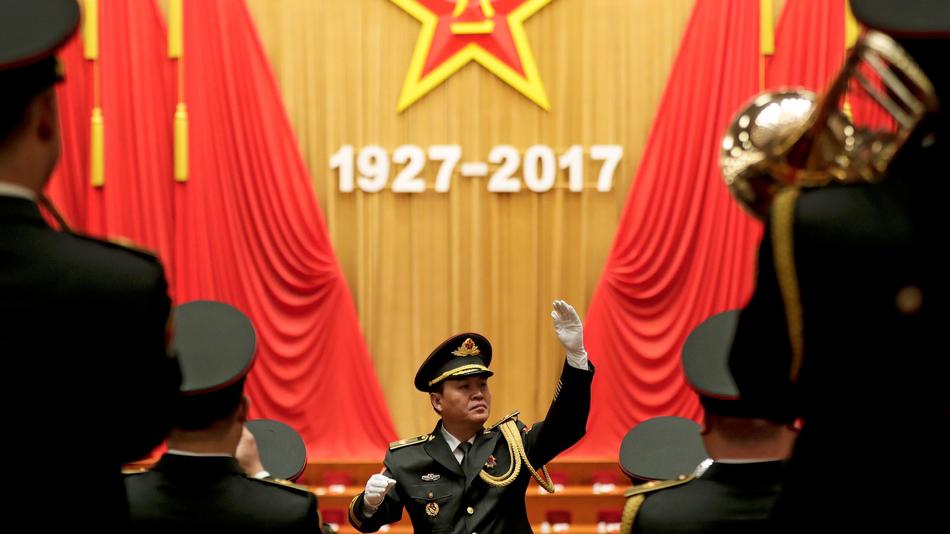Media Report

- Quartz reports: "China just set the date for its twice-a-decade leadership reshuffle: the ruling Communist Party will hold its 19th national congress on Oct. 18. As the big day nears, lots of the behind-the-scene political struggles are gearing up... Speculation is mounting that Chinese president Xi Jinping could break away from convention to hold onto power for 10 more years, rather than five. Another key reshuffle is already underway in the run-up to the congress. In recent days, Xi has promoted favorites to top posts in the People's Liberation Army (PLA). Xi chairs the Central Military Commission, a 11-member top decision-making body of the Chinese military, the world's biggest. Since 2015, Xi has launched a string of military reforms including cutting troop numbers and regrouping existing military districts. He also waged war against allegedly corrupt military officials—prominent among them are two disgraced top generals, Xu Caihou and Guo Boxiong... 'To build a strong military, we must unswervingly adhere to the Party's absolute leadership over the armed forces,' Xi said in a speech marking the PLA's 90th anniversary last month. Undoubtedly, the leadership is with Xi at its core, as reflected by the recent personnel changes."
- Foreign Policy comments: "After 10 weeks, the latest chapter in the long-running China-India-Bhutan border dispute has come to an end. On Monday, India and China agreed to remove their troops from a disputed region called the Doklam Plateau, claimed by both China and Bhutan... Although the dust-up failed to attract much attention from the international community, it is nonetheless worthy of note, both for what it says about a rising China's more forward-leaning approach to its neighbors, and also for what it says about the Trump administration's strangely inattentive approach to an increasingly restive Asia... One wonders whether this particular standoff highlights rising China's disinterest in actually resolving its border disputes with India and Bhutan. After all, it was Chinese border activity that provoked the standoff. Once the scuffle began, Beijing maintained an aggressive and aggrieved tone. Its public rhetoric was all stick and no carrot. Beijing also insisted, both publicly and privately, that an Indian withdrawal of troops should precede any negotiated solution, a demand that was hard to square with the fact that, in this case, it had moved first to change the status quo. None of these moves indicate that China is anxious to conclude a final deal anytime soon."
- CNN reports: "When Russia sent its bombers flying over the Korean peninsula last week, it was as much a signal to its allies in Beijing as it was a telegraph to Washington that Moscow too, was pivoting to Asia. The Kremlin may not become Pyongyang's most steadfast and critical defender in this newest conflagration, but its cameo in the region is another attempt by Russian President Vladimir Putin to insert himself into a geo-political stalemate involving the US. Experts say it may also help deflect attention from upcoming military exercises in Belarus and western Russia next month, which have upset NATO members concerned about what amounts to a mass buildup of Russian troops on the edges of eastern Europe. China, which sent bombers into the air itself shortly after, declined to comment about the show of force from Moscow. In its regular press briefing on Wednesday, the Chinese Foreign Ministry said it would not 'quantify how close China and Russia are cooperating on the North Korean nuclear issue,' said Hua Chunying, a ministry spokeswoman."
Calendar
- 2017-08-31 China-US Trade Wars and the IP Elephant in the Room
- 2017-08-30 Trump wants China to fix North Korea, but it isn't going to happen
- 2017-08-29 The North Korean Threat Beyond ICBMs
- 2017-08-28 India, China agree to pull back troops to resolve tense border dispute
- 2017-08-27 Chicago Exchange Sale Looks Shaky as China Tensions Rise
- 2017-08-25 China’s Big Businesses Risk Trump’s Punishment Over North Korea
- 2017-08-24 China to use ‘all means necessary’ to defend itself against Trump ‘protectionism’
- 2017-08-23 China demands U.S. immediately withdraw N. Korea sanctions, warns will hit ties
- 2017-08-22 US targets Chinese, Russian entities funding North Korea's nukes
- 2017-08-21 Bannon exit provides only temporary relief to China
News
- Quartz As China's big leadership revamp nears, Xi Jinping is carrying out a military reshuffle
- CNN Russia's power play in North Korea aimed at both China and US
- Reuters China says Xi transcends West as a diplomatic 'pioneer'
- CNBC Caixin China August manufacturing PMI hits 6-month high on strong demand
- Fox China-India friction goes way beyond borders
- New York Post You can now smile to pay for your KFC meal in China
- The Washington Post China exports its bike-sharing revolution to the U.S. and the world
- Bloomberg China's New Stock Mantra
- CNBC China's artificial intelligence technology is fast catching up to the US, Goldman Sachs says
- The Washington Post Efforts to mend China-Vatican rift seem stalled over bishops
- CNBC The SEC warned about the risks of cryptocurrencies — now a Chinese industry body is doing the same
- Reuters China's property market is a major source of financial risk: central bank official
- Variety 'Wolf Warrior II's' Massive Success Forces Studios to Rethink China Approach
Commentary
- Foreign Policy The China-India Border Standoff: What Does Beijing Want?
- Bloomberg China's Nigerian Misadventures
- The Diplomat China and India: A Lesson in Conflict Resolution
- Associated Press A brief explainer on the BRICS summit in China's Xiamen
- China Law Blog Selling Your Product into China: Eight Key Questions
- The National Interest South Korea's Greatest Fear (and It Isn't a North Korean Invasion)
- Foreign Policy China Finally Has Its Own Rambo
